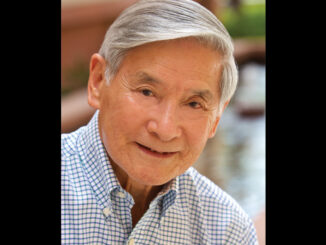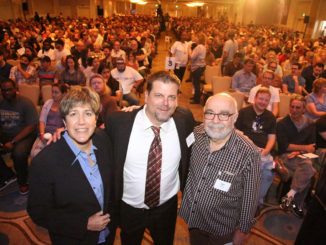
Where are you currently employed?
I’m a freelance MPEG sound editor based in New York where I collaborate with various companies and teams.
Current projects?
I recently completed my work on season 2 of “Dr. Death” and will shortly begin work on season 2 of “The Serpent Queen.”
Describe your job.
I work as a sound editor for movies, mainly focusing on theatrical films and TV series. My job is to create and shape the sound in films to make them more immersive for the audience. In film production, usually only dialogue is recorded on set. So during post-production, the dialogue editor cleans and edits dialogue recordings to prepare them for the sound mix. The sound effects editor works on background sounds and special effects. The Foley editor arranges sounds recorded in sync with pictures and created by Foley artists on a dedicated sound effects recording stage to match characters’ movements and actions. The music editor precisely places original music cues and/or licensed recordings in sync with pictures for optimum emotional impact. Finally, all these edited sounds are mixed together by the re-recording mixer(s) to fit perfectly in each scene. It’s a team effort, and together we bring stories to life, creating a memorable auditory experience for the audience.
How did you first become interested in this line of work?
My college major at the Shanghai Conservatory of Music was piano performance, but an elective course on film sound design unexpectedly ignited my passion for film sound editing and sound design. I was blown away to discover that sound is painstakingly constructed layer by layer in the post-production process. It’s truly remarkable! So, I made the decision to pursue a master’s degree in Sound for Motion Pictures at the University of Miami.
Who gave you your first break?
On season 3 of the Apple+ TV series “Dickinson,” my supervisor, Luciano Vignola, gave me the opportunity to be a sound effects editor. That was my first editor job. It was a fun project that provided ample opportunities for inventive sound design — from the chaos of a Civil War battlefield to the mind-bending concept of time travel, from the eerie ambiance of a lunatic asylum to the harrowing depths of the inferno. Each of these challenges encouraged me to experiment with sound, expanding my passion for the craft and pushing the limits of auditory storytelling. I was happy that my sound effects work turned out well and everyone was satisfied with the results. Luci’s mentorship and trust in my abilities played a pivotal role in shaping my career, and I will always be grateful for that chance to prove myself in the field.
What was your first union job?
During the year following my graduation from the university, I had the privilege of meeting Suzana Peric, who had just begun working as the music editor for “Little Women.” I had the honor of working alongside her for several months, collaborating on searching for appropriate classical music compositions and arrangements, facilitating and organizing recording sessions, and more. I thoroughly enjoyed my time working on that job, and it was a valuable experience.
What credits or projects are you proudest of, and why?
Season 3 of “Dickinson” and season 3 of “The Righteous Gemstones Season 3” are milestones for me. “The Righteous Gemstones” gave me my first experience as a Foley supervisor in a TV series. I was responsible for cueing and editing Foley, which involved overseeing all sound effects recorded in sync with the picture — character actions including footsteps, clothing rustling, and other physical interactions with people and objects in the story’s world.
Additionally, I needed to gather sounds that are typically challenging to find in standard sound effect libraries, like the sound of wooden planks breaking or the delicate vibrations of insect wings. In one episode, there is a long scene that features a swarm of locusts. To ensure an authentic and impactful sound experience while considering the intricacies of Dolby Atmos mixing, we recorded and edited multiple layers of distinct locust sounds. These layers included the dramatic whooshing of the swarm through the air, the percussive impact of locusts hitting various surfaces like wood, concrete, and metal, and the unsettling sound of locusts being crushed underfoot. The final audio result, especially when experienced in Atmos, is nothing short of astonishing. The producer was very satisfied and impressed with the outcome. It was a fantastic working experience.
What was your biggest challenge in your job (or on a particular project) and how did you overcome/solve it?
I find that every project comes with its own challenges, whether it’s the pressure of adhering to a tight schedule, striving to craft a truly satisfying sound design, or encountering unexpected technical issues. What I’ve learned is that good communication and patience are essential. Film and television are collaborative efforts, and sound for those media, no less so. Effective communication with colleagues and supervisors is often the key to resolving any issues and ensuring the project’s success.
What was the most fun you’ve had at work?
The most enjoyable moments for me at work are when I create something that I find really satisfying, or when I receive positive feedback from audiences. Knowing that I’ve contributed to the storytelling means a great deal to me, and it also serves as motivation for me to continue producing quality work.
Jobwise, what do you hope to be doing five years from now?
My aspiration is to become a more proficient sound editor, particularly for drama features and TV series. I aim to gain extensive experience in both dialogue and sound effects editing and to collaborate with an ever-widening array of talented individuals in the industry.
What are your outside activities, hobbies, passions?
I am a big fan of concerts, art galleries, and museums. Arts share a common purpose: to convey beauty and inspire creation. I’ve been a musician for over 20 years. Even though I’ve transitioned into the film industry, music still has a profound influence on me. I feel that sound shares remarkable similarities with music. When I create a soundscape, it feels akin to a composer crafting a score. Music employs notes and melody to express emotions and atmosphere, while sound design utilizes various elements to enhance the auditory and emotional experience in film.
Favorite movie(s)? Why?
There is an abundance of exceptional movies out there, so it’s a challenge to pinpoint my absolute favorites. Personally, I’m more into dramas that have compelling storylines, particularly those that carry a touch of tragedy or sadness. For me, films like “The Insider,” “25th Hour,” and “The English Patient” stand out not just for their compelling stories but also for their terrific music and sound. I have those soundtrack albums and many others on my Spotify.
Favorite TV program(s)? Why?
“Criminal Minds,” “Breaking Bad”. I love the intriguing explorations of criminal psychology, complex character arcs, and moral dilemmas that make their narratives so involving.
Do you have an industry mentor?
I’m fortunate to have several mentors, but among them, Jeffrey Stern holds a special place. He was a renowned dialogue editor in New York before he retired and also happened to be my professor in the university. He selflessly imparted his extensive knowledge and skills to me, even affording me the opportunity to collaborate on independent feature films while I was still a student. Furthermore, he played a pivotal role in helping me establish industry connections that became the bedrock of my future career. Beyond mentorship, Jeffrey has become a dear friend, and whenever he returns to New York, we always catch up over coffee.
What advice would you offer to someone interested in pursuing your line of work?
Be humble, be patient, and stay prepared; opportunities will present themselves when you are ready.
Was there ever a circumstance when you had to rely on the Guild for help or assistance?
Fortunately, I haven’t needed it, but I’m confident the Guild will be there for me should the need arise.
Is there anything you’d like to say to your fellow Guild members, some words of encouragement?
Being a member of a union and the post-production community is truly fantastic. I feel honored and enthusiastic to collaborate with so many talented and dedicated individuals, and I look forward to many years of creating stories with them for audiences worldwide to enjoy.





